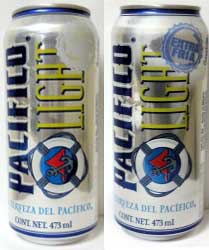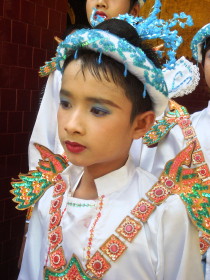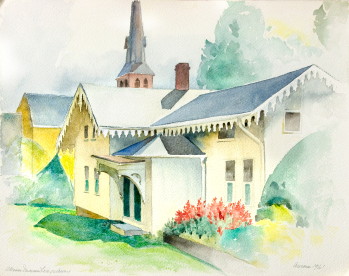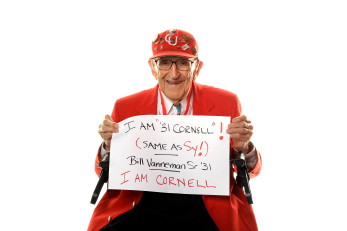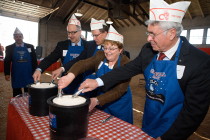ESSENTIALS
The Essentials
Hot or cold? Thermochromic ink business thrives on both
When Lyle Small '93 lived off campus on Willard Way, he used a Ping-Pong table as a workbench for months, testing his evolving recipes for pigments that change color when exposed to light, heat or cold.
While his housemates were annoyed that the table couldn't be used for games, Small says he "amused them with the weird stuff I was creating down there."
Nearly two decades later, that "weird stuff" has grown into Chromatic Technologies Inc., based in Colorado Springs, Colo., a business with sales approaching $13 million annually and with 38 employees – and responsible for color-changing ink technology perhaps best known to consumers through the "cold-activated" Coors Light beer cans (the mountains in the logo turn blue when the beer is optimally cold). The technology is being widely used to make consumer packaging stand out.
"I have always been interested in innovation and business, so when a friend introduced me to thermochromic materials, I was fascinated and wondered why all consumer goods didn't change colors or interact with people when they used them," Small says. "I have been obsessed with this question, at varying degrees, ever since."
He launched the business a few months before graduation. Small says his experience at Cornell was "crucial in preparing me for life as an entrepreneur. … I knew that Cornell would not tolerate mediocrity from me or anyone else, and that was invaluable later in my career."
Robert Lieberman's film 'They Call It Myanmar' reveals the hidden Burma
Filmmaker and senior lecturer in physics Robert H. Lieberman risked imprisonment while making his most recent documentary, "They Call It Myanmar: Lifting the Curtain," shot clandestinely in the former Burma over a 30-month period.
Lieberman shot more than 120 hours of video and interviewed hundreds of people (including opposition leader Aung Sang Su Kyi, who last year was released from 15 years of house arrest by the harsh military regime) to produce the 90-minute documentary – a portrait of the Burmese people and their country, which is mostly unknown to the rest of the world.
"It's a very unusual country because of its isolation, and the Burmese are very different from the rest of Southeast Asians," Lieberman says. "They have an incredible sense of humor, and despite the oppression, they smile, and it's a genuine smile."
Lieberman made four trips to Myanmar, starting with his 2008 posting to the American Embassy in Rangoon as a Fulbright senior specialist, training young directors to produce commercials and public service ads. On a subsequent trip, he taught film production at the fine arts university in Rangoon. Lieberman had others help him smuggle his footage out of the country on hard drives.
Visit http://theycallitmyanmar.com for more information.
Campus mural artist Kingsbury rediscovered in new book
Jillian Piccirilli '08 has formed a close relationship with a woman she'll never meet: the late Alison Mason Kingsbury, an accomplished artist, dedicated Ithacan and wife of Cornell historian and professor Morris Bishop.
Alison Jolly, the artist's daughter, began working with Piccirilli in 2008 to create a catalog of her mother's work that grew into a book, "The Art and Life of Alison Mason Kingsbury," published by Cornell University Library.
Although Kingsbury (1898-1988) wasn't a Cornell graduate – her father, who earned an engineering degree from Cornell, said he "didn't approve of the way the co-eds were treated during his day," Jolly noted – she was unquestionably a Cornellian, creating some of the most recognizable artwork on Cornell's campus. They include murals at the Gannett Health Clinic, Willard Straight Hall and the World War I Memorial.
"Although her art on the Cornell campus is very public, she is really not recognized, and she is an extraordinary artist," Jolly said.
The book contains about 80 illustrations and photographs and is supplemented by an online database with more than 500. Piccirilli estimates that Kingsbury's entire body of work totaled about 1,500 items. The library's Division of Rare and Manuscript Collections holds a large collection of her work, including original sketches and illustrations of some of her husband's books and several Works Progress Administration projects. She also created illustrations for the 10th edition of the Fannie Farmer cookbook, published in 1959.
Cornell proposes 'transformative' NYC campus
Cornell's New York City footprint may soon grow much larger with the addition of a new applied sciences research center and campus. The campus will be charged with enhancing the commercialization of research and technologies developed at Cornell that will benefit NYC economic development. Answering a call for expressions of interest from the New York City Economic Development Corporation, the university's is one of 18 preliminary proposals from 27 academic institutions and companies planning to respond to a Request For Proposals for the project to be released by Mayor Michael Bloomberg this summer.
"New York City attracts the best and Cornell University is eager to go up against the best," said President David Skorton.
"We welcome the mayor's vision, and we think that this broad and open approach is the best way to identify the most successful potential academic partnership to secure the city's tech future," Skorton said. "We firmly believe that Cornell's combination of academic excellence in engineering and computing sciences, leadership position in the technology industry, and strong existing presence in the city make us an ideal candidate, and that the competitive process will lead to a better outcome for New Yorkers."
The university's presence in New York City is already strong, with over 50,000 alumni, approximately 5,000 employees, a world-class medical facility and many college programs, making it the natural partner for New York City.
This universitywide initiative is being led by President Skorton, Provost W. Kent Fuchs, Dean of the College of Engineering Lance Collins and Dean of Computer and Information Science Dan Huttenlocher.
Follow our progress at www.nyc.cornell.edu.
Bill Vanneman '31 dies at age 102
William "Bill" Vanneman '31, who helped organize – and was planning to attend – Cornell's first 80th class reunion in June, died April 26 at age 102.
Vanneman, of Cape Cod, Mass., had served as president of his class since his graduation eight decades ago and had become an annual fixture at Reunions.
He was the namesake and the first recipient of the Bill Vanneman '31 Outstanding Class Leader Award, established in 2005 to honor alumni service.
When Vanneman found out in 2005 that the Class of 2000's treasury was low as they faced their first Reunion, "he jumped in on behalf of his own Class of '31 to prop up our reunion funds," recalls Andrea Wasserman '00.
"Bill's Cornell pride and enthusiasm were contagious," Wasserman says. "I'll never forget his jovial nature and his affinity for dressing in full Cornell regalia at every event. I'm crushed to learn of his passing and grateful that his spirit and generosity will live on. Personally, Bill inspired me to look for ways to help future generations of Cornell alumni."
Vanneman had planned to join classmates Rosemary Hunt Todd and Ethel Bache Clark at Reunion.
The Cornell Vanneman legacy includes Bill's sons, William Vanneman Jr. '65 and Reeve Vanneman '67; his daughter-in-law, Jane Wallace Vanneman '68; his granddaughters, Michelle Moore Vanneman '89 and Kara Vanneman Klein '89, and Kara's husband, Kenny Klein '87. His father, C. Reeve Vanneman, was a member of the Class of 1903.
Share your memories of Vanneman (pictured above at Reunion 2010 during his "I am Cornell" photo shoot) at http://alumni.cornell.edu/vanneman.
The scoop on Stocking Hall
Instead of shovels and dirt, a May 9 groundbreaking used scoops and ice cream, fitting symbols for New York state's $105 million project to renovate Stocking Hall – the 88-year-old home of the Cornell Department of Food Science.
Cornell President David Skorton and Kathryn Boor, dean of the College of Agriculture and Life Sciences, along with New York State Commissioner of Agriculture and Markets Darrel Aubertine and more than 150 students, faculty and stakeholders celebrated the groundbreaking at the Cornell Livestock Pavilion. (Image: from left, Skorton, Dennis Miller, professor of food science, Boor and Aubertine.)
The project will replace the iconic Cornell Dairy Bar and Plant with a new building featuring a glass-fronted dairy plant, a wine library and teaching winery, research laboratories and a center for sensory evaluation of foods. From an observation balcony above the dairy plant, visitors will have a bird's-eye view as milk from the Cornell dairy farm becomes ice cream, cheese and yogurt. It will be completed in 2014 and will expand training and boost Cornell's competitiveness in food science.
